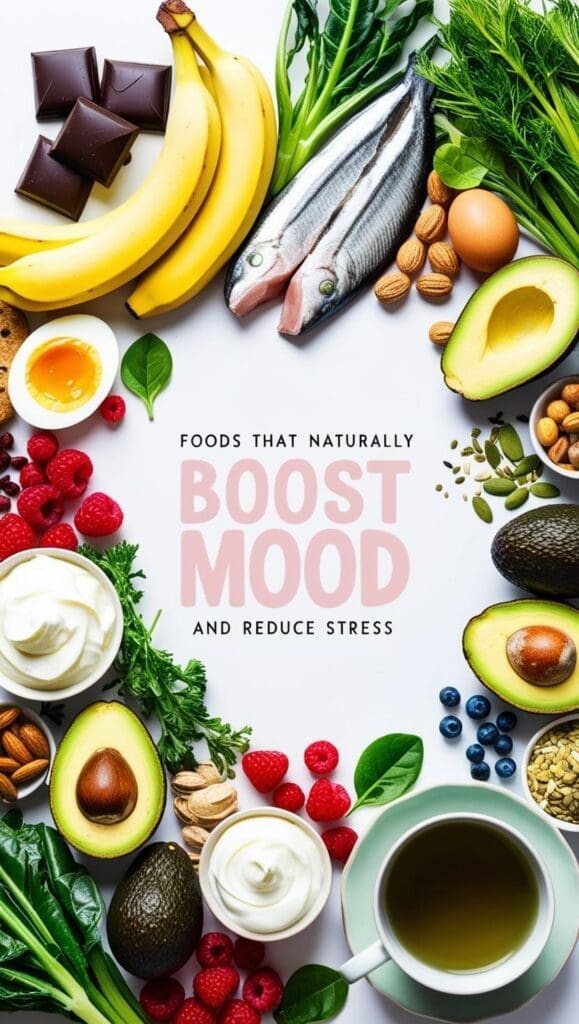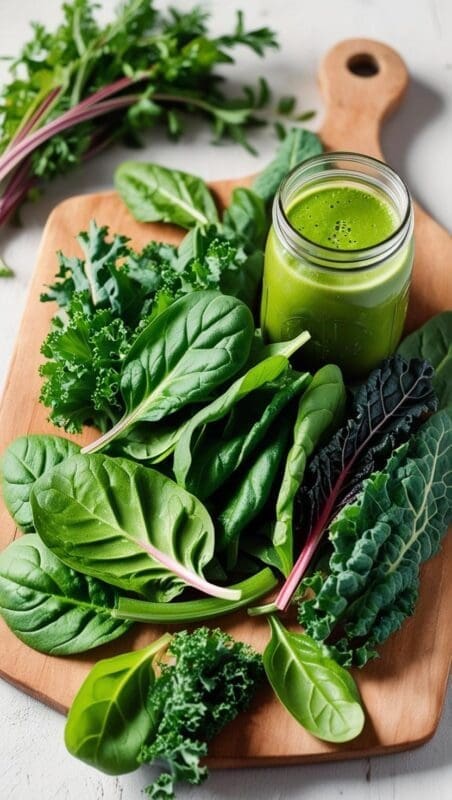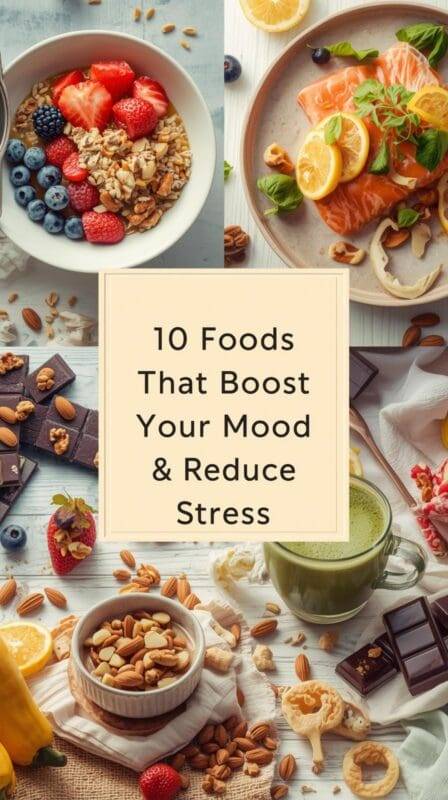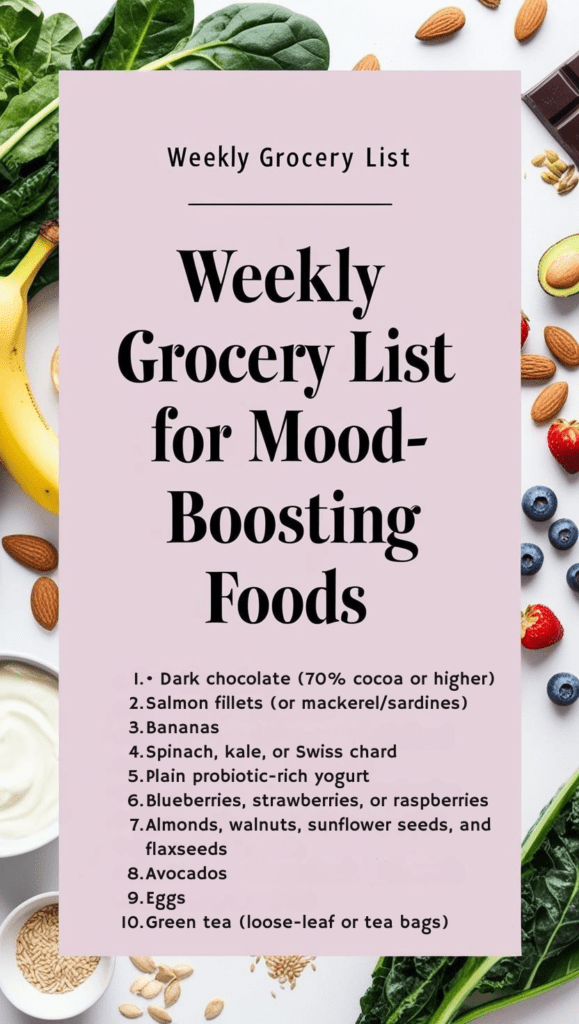Life can get overwhelming, and during those moments, we often turn to food for comfort. But what if the right foods didn’t just bring temporary relief but actively improved your mood and reduced stress long-term? Let’s dive into some scientifically-backed foods that can support serotonin production, reduce anxiety, and promote emotional well-being. Your next grocery trip might just change your outlook on life!
The Connection Between Diet and Mental Health
1. Dark Chocolate: The Sweet Mood Booster
Dark chocolate (70% cocoa or higher) isn’t just a treat; it’s a brain booster. Rich in magnesium, it helps relax muscles and calm nerves. Magnesium is known for its role in reducing stress and anxiety, making dark chocolate a perfect antidote for a frazzled day. Dark chocolate also stimulates the production of endorphins and serotonin, the body’s natural “happy” chemicals.
How to enjoy: Snack on a square or two, or add it to your morning oats for a delicious and mood-enhancing start to your day.
2. Fatty Fish: Omega-3 for Emotional Balance
Salmon, mackerel, and sardines are packed with omega-3 fatty acids, which are essential for brain health. Omega-3s have been shown to reduce symptoms of depression and anxiety by improving neurotransmitter function and reducing inflammation in the brain.
How to enjoy: Grill or bake a salmon fillet for dinner, or toss sardines into a fresh salad for a nutrient-dense lunch.
3. Bananas: Nature’s Mood Lifter
Bananas are high in vitamin B6, which is crucial for serotonin production. They also provide quick energy through natural sugars and fiber, stabilizing blood sugar levels and preventing mood swings.
How to enjoy: Blend a banana into a smoothie, or enjoy it with a dollop of nut butter for a satisfying snack.
4. Leafy Greens: Stress-Reducing Superstars
Spinach, kale, and Swiss chard are loaded with magnesium and folate, both of which help reduce stress and promote relaxation. Folate, in particular, supports the production of dopamine, a neurotransmitter associated with pleasure and motivation.
How to enjoy: Use leafy greens as a base for salads, sauté them with garlic, or blend them into a green smoothie.
5. Yogurt: The Gut-Brain Connection
Probiotic-rich yogurt improves gut health, which directly influences mood. The gut is often referred to as the “second brain” because it produces many neurotransmitters, including serotonin. A healthy gut means a happier you.
How to enjoy: Add a handful of berries and a drizzle of honey to plain yogurt for a gut-friendly breakfast or snack.
6. Berries: Antioxidants for Emotional Resilience
Blueberries, strawberries, and raspberries are antioxidant powerhouses. Antioxidants combat oxidative stress, which is linked to depression and anxiety. They also reduce inflammation, another factor that can impact mood.
How to enjoy: Sprinkle them over yogurt, blend them into smoothies, or enjoy them fresh as a snack.
7. Nuts and Seeds: Tiny Powerhouses of Happiness
Almonds, walnuts, sunflower seeds, and flaxseeds are rich in magnesium, healthy fats, and tryptophan—a precursor to serotonin. Walnuts, in particular, also contain omega-3 fatty acids for added brain benefits.
How to enjoy: Mix nuts and seeds into trail mix, sprinkle them over salads, or enjoy a handful as a quick snack.
8. Avocados: Creamy Stress Relief
Avocados are loaded with B vitamins and monounsaturated fats that nourish the brain and reduce stress. They also support the nervous system, helping you stay calm and focused.
How to enjoy: Mash avocado onto whole-grain toast or blend it into a creamy smoothie.
9. Eggs: The Perfect Brain Food
Eggs are rich in choline, which supports the production of acetylcholine, a neurotransmitter that plays a role in mood regulation and memory. They also contain vitamin D, which has been linked to lower rates of depression.
How to enjoy: Start your day with scrambled eggs, or hard-boil a few for an easy snack on the go.
10. Green Tea: A Calm in Every Cup
Green tea contains the amino acid L-theanine, which promotes relaxation without drowsiness. Combined with a mild dose of caffeine, green tea enhances focus while keeping stress at bay.
How to enjoy: Sip on green tea during a midday break or enjoy it as a calming ritual in the evening.
The Connection Between Diet and Mental Health
We’ve all experienced it – the energy boost after a nourishing meal or the crankiness that follows a junk-food binge. It’s not just in your head: there’s a powerful link between what we eat and how we feel. Think of your brain as a high-performance engine that runs best on quality fuel. Eating nutrient-rich foods (like fruits, vegetables, whole grains, and lean proteins) literally feeds your brain, providing the vitamins and minerals it needs to regulate mood and stress effectivelyhealth.harvard.edu. In fact, Harvard health experts note that what you eat directly affects the structure and function of your brain and ultimately, your moodhealth.harvard.edu. On the flip side, a diet high in ultra-processed snacks and refined sugars can backfire by causing inflammation and oxidative stress, which may leave you feeling more anxious or bluehealth.harvard.edu.Another big reason food influences mood lies in the gut-brain connection. Your gut and brain are in constant communication – so much so that the gut is often called our “second brain”healthline.com. The trillions of bacteria in your digestive tract help produce feel-good neurotransmitters (like serotonin) that influence stress levels, sleep, and emotional well-beinghealthline.com. When you nourish these friendly gut microbes with fiber (think veggies, fruits, whole grains) and probiotic foods (like yogurt or kefir), you’re essentially helping your body create more mood-regulating chemicals. But if your diet lacks these nutrients – or if it’s loaded with processed foods – it can disrupt this balance, potentially making it harder to cope with stress.
The good news is that improving your diet can genuinely improve your outlook. Multiple studies have found that people who follow balanced, whole-food eating patterns tend to feel calmer and happier. For example, the Mediterranean diet – rich in vegetables, fruits, fish, nuts, and olive oil – has been linked to fewer symptoms of depression and anxietyhealth.clevelandclinic.org. These wholesome foods keep blood sugar stable and provide antioxidants, which together help maintain steady energy and moodhealth.clevelandclinic.org. On the other hand, skipping meals or riding a sugar rollercoaster can lead to irritability and fatigue. The bottom line? By choosing nourishing foods, you’re not just fueling your body – you’re also feeding your mind, equipping it to handle stress and making it easier to find your smile on tough days.
Sources: Harvard Health Publishinghealth.harvard.eduhealth.harvard.eduhealth.harvard.edu, Healthlinehealthline.comhealthline.com, Cleveland Clinichealth.clevelandclinic.orghealth.clevelandclinic.org.
Quick Tips to Incorporate Mood-Boosting Foods
- Plan ahead: Create a weekly meal plan that includes at least 3-4 of these foods daily.
- Snack smart: Keep nuts, seeds, and dark chocolate on hand for quick, nutritious snacks.
- Experiment: Try new recipes that feature these ingredients, like a salmon avocado salad or berry smoothie bowls.
- Listen to your body: Notice how you feel after eating these foods and adjust your intake based on what works best for you.
Weekly Grocery List for Mood-Boosting Foods
- Dark chocolate (70% cocoa or higher)
- Salmon fillets (or mackerel/sardines)
- Bananas
- Spinach, kale, or Swiss chard
- Plain probiotic-rich yogurt
- Blueberries, strawberries, or raspberries
- Almonds, walnuts, sunflower seeds, and flaxseeds
- Avocados
- Eggs
- Green tea (loose-leaf or tea bags)
Final Thoughts
Your diet has a profound impact on your mood and stress levels. By prioritizing these 10 foods, you’re not just feeding your body but also nurturing your mental and emotional well-being. Small changes in your meals can lead to big changes in your mood—one bite at a time.
Ready to fill your plate with happiness? Share your favorite mood-boosting recipes or tips in the comments below! And don’t forget to subscribe to eveyou.eu for more insights on emotional wellness and healthy living.

About the Author
Hi, I’m Eve, a former school counselor with a master’s degree in School Psychology and a passionate advocate for children and families navigating sensory challenges. As a mom of children with sensory sensitivities, I deeply understand the journey special-needs parents face, and I dedicate myself to researching and sharing practical solutions to help children thrive and feel comfortable in their bodies. My goal is also to empower counselors, therapists, and psychologists with creative strategies and supportive resources to enrich their everyday practice. When I’m not writing or exploring new therapeutic approaches, you’ll find me spending quality time with my family and continually seeking inspiration from everyday moments.









